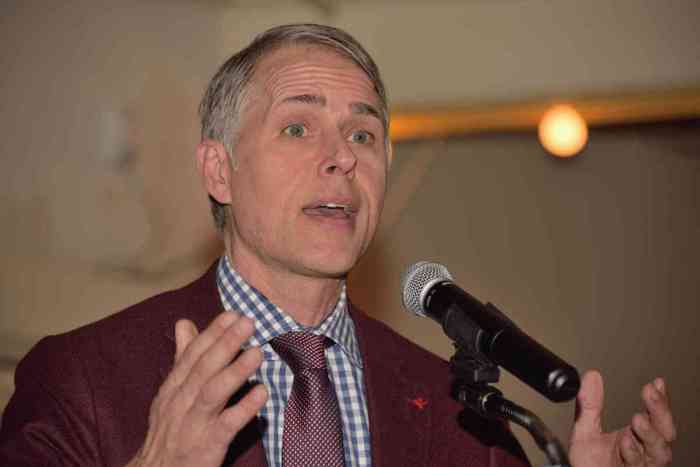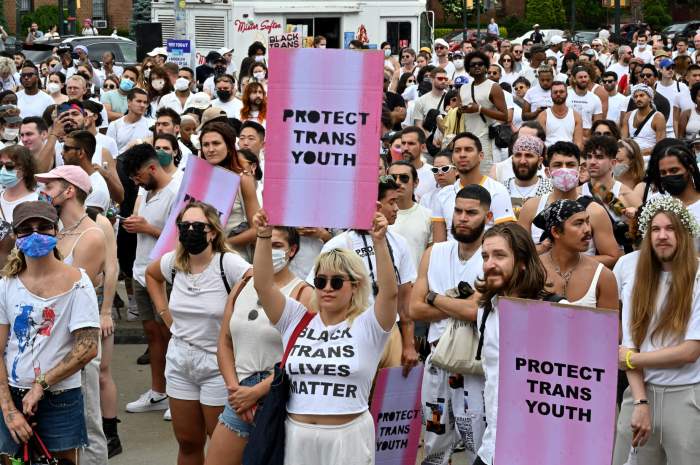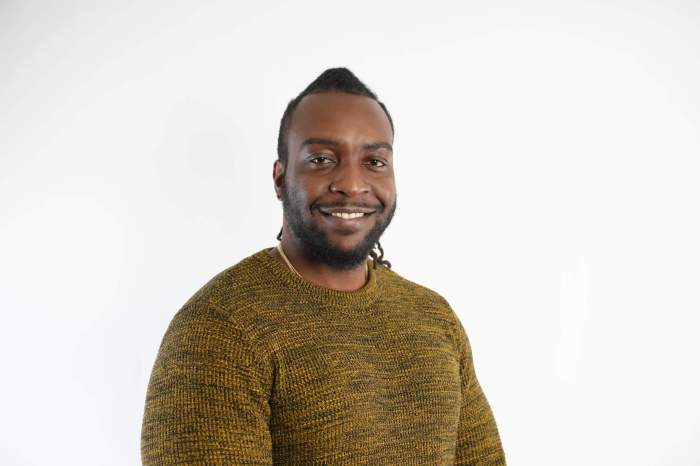BY BRANDON BROCK | “So… do you think we should get married?” my boyfriend casually asked during dinner at our favorite restaurant in Astoria.
I replied that our relationship was of course heading toward marriage. One day. After all, we had already moved in together and bought a puppy, Mr. Humphries.
“Would your mother be on board?” I pondered aloud between bites of my chicken cutlet. “Should we wait until we’ve been together for more than two years?”
In typical fashion, I moved our table chatter toward another random topic until that subject was too exhausted to continue. The talking slowed to a trickle as we sat together at our table, taking a bite of salad, a sip of wine, in momentary silence.
The next time you’re in a crowded restaurant, you might well notice at least one couple that has reached this point in their relationship. Lulled into that easy, comfortable intimacy that only time can bring, the two can begin to take each other for granted. Gone are the days when their relationship was new and fiery — hot and fast like a boiling pot of water. The silent couple has exhausted the quick talk of two people who are becoming acquainted with each other. They know each other well, and the heat has reduced to a comfortable simmer — though, to be sure, one capable of bringing out more succulent, complex flavors.
“So, you don’t want to get married then?” Alex cautiously asked in an uncharacteristic return to our previous topic.
Alex had just proposed to me, and I hadn’t noticed.
The proposal was quintessentially Alex— fully thought out, methodical, and with no grand gestures. My boyfriend and I are remarkably similar to the fictional couple of Mitchell and Cameron from TV’s “Modern Family.” Alex and Mitchell are both lovable, smart attorneys with a penchant for deliberate speech and pragmatism. Much like Cameron, I romanticize things, I’m more emotional, and I take a lot of pride in the right amount of paisley in my wardrobe.
“Yes, baby. Let’s get married,” I said with a smile at what I now understood was Alex’s proposal. And with that, we were engaged.
Alex and I met on an online dating site. After chatting back and forth for a couple of weeks, we finally met for a drink near Madison Square Park. He had just the right amount of flirt, humor, interest, and curiosity about the world to make me ask for a second date.
The only free night on his calendar was the following Tuesday. I was busy meeting with Western Queens for Marriage Equality, a grassroots organization that formed to lobby Astoria’s state senator to support New York’s marriage equality bill. I suggested that Alex join me at the meeting in Astoria, and, to my surprise, he agreed.
The meeting was longer than I expected, and I began to worry I had ruined my potential relationship with Alex by dragging him into the dirty world of Queens politics. Luckily for me, Alex would later admit that my passion for marriage equality made him ask for a third date.
Most couples are engaged for well over a year before they get married. We want to wait until we can legally marry in New York State. But how long should we — and other same-sex couples — wait?
Several friends have suggested that waiting for marriage might be a bad idea. “Take a train to Hartford or Boston, get married, and have a ceremony in New York when it’s legal here.” “Do it for the legal rights today.” After all, an out-of-state marriage would be recognized within New York State.
If we wait, should we go to the New York City Marriage Bureau and register as domestic partners? Our relationship would be recognized by our city, and we would gain access to a number of important rights as a result.
But this is the same office that offers quick civil marriages for any straight couple with the proper forms and identification cards. And I can think of few things as insulting as checking off the metaphorical “same-sex” box on our application and being forced to stand in the domestic partner line. Marriage is literally cordoned off from same-sex couples. It would be a blatant reminder of our inequality. There would be no cause for celebrating our relationship.
It doesn’t have to be this way. In 2007 and 2009, New York Governors Eliot Spitzer and then David Paterson themselves took the lead in introducing same-sex marriage legislation. The New York Assembly passed such a bill as early as 2007, but the Republican majority that then ran the State Senate prevented a vote there. In 2008, whether by hard work or a twist of fate, the Democrats finally seized the majority in the Senate. At last, we thought, perhaps the bill would be brought to the floor and we would have marriage equality in the Empire State.
But not all Democrats were on board. In the spring of 2009, State Senator George Onorato announced that he would vote against the marriage equality bill. Onorato represented Astoria, a very diverse neighborhood in Queens with a sizable and visible LGBT community. The senator’s announcement resulted in instant grassroots mobilization. Community members came together to launch Western Queens for Marriage Equality, and the group started making waves in the local political scene.
We passed out leaflets at subway stations and spoke with anyone who would listen. “Did you know that your state senator plans to vote against marriage equality?” Most people had no idea how laws are passed or who represented them in Albany, but they were certain about their support for civil marriage equality. People of all ages, backgrounds, languages, and races thanked us for our work.
We gave out the senator’s office phone number, and our neighbors flooded the line with calls in support for same-sex marriage. We created YouTube videos demonstrating the widespread support for marriage equality among Onorato’s everyday constituents, and forwarded them to his staff. We held a rally with an estimated crowd of more than 2,500 participants, an unbelievably high number for our neighborhood. Nevertheless, the senator maintained his opposition to the marriage bill.
In June 2009, news broke of a likely Senate vote on marriage within a day. At the drop of a hat, I arranged to take time off from work and travel to Albany with Marriage Equality New York. It proved to be useless; political infighting prevented the marriage bill from seeing the light of day. Another rumor surfaced, and I was off to Albany for a second time, again without success.
Then, on December 2, I found myself sitting with 20 other marriage equality activists in the gallery of the New York State Senate. Having made the trip to Albany two times before, I had no more vacation days left at work. December 2 was the last day I could possibly watch the vote take place. And it did.
Unsurprisingly, my emotions were running high as I watched the senators rise to address the chamber. Eloquent, passionate speeches focused on New York’s national leadership from the creation of the Erie Canal, the 19th century’s economic marvel, to strides made in the civil rights movement. That day would be another chapter on the road to civil rights. Senators gave speeches that brought tears to many eyes. As the vote finally arrived, the viewer’s gallery held its collective breath.
But the bill failed. Every Republican senator and eight Democrats voted against my community and against Dr. King’s famed arc of history. New York would not be the national leader that year. Senator Onorato, on whom I had spent so much time and energy, kept his word and voted against the marriage bill.
I turned to hug my friend Betsy as the Senate session ended, and we both released our pent-up emotions. I looked around and saw that everyone was caught up in a similar embrace. No one was mad at the senators who had voted against the bill; disappointed, yes, but there was no anger. There was only sorrow for the community beyond those of us sitting there. Everyone around me was voicing a single phrase: “I’m sorry.”
Apologies are given when one regrets the emotions or suffering of another person. We weren’t sorry for ourselves; we were sorry for the message that the New York Senate was sending to same-sex couples. We were sorry that we were unable to avenge, if only slightly, the injustice of Proposition 8. We were not fighting for marriage equality for ourselves; we were fighting for our community outside the Senate Chamber.
Throughout my time as a marriage equality activist, I advocated for equality under the law. But a year after marriage equality failed in the New York State Senate, marriage has an entirely new and more personal meaning. Equal marriage rights would honor not only the loving commitments made by thousands of other couples who are waiting for New York, but specifically my relationship with Alex.
Until that moment arrives here, we all wait.


































